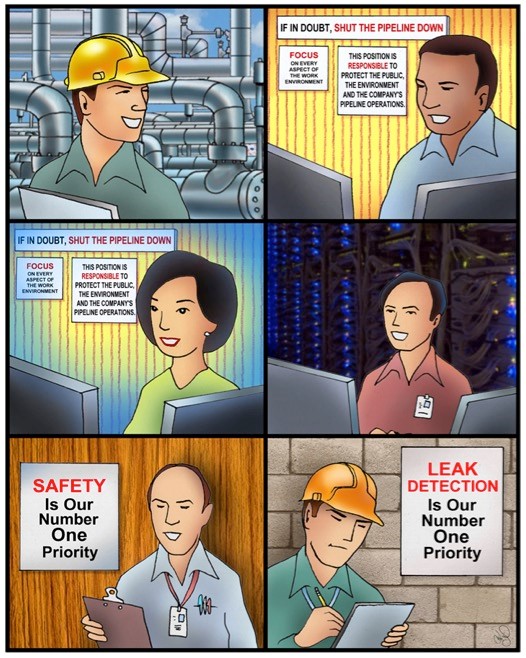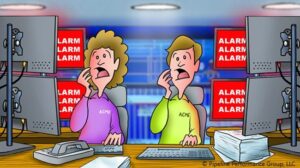No one in a control room does anything alone! I can imagine the howls of indignation from control rooms with one lone controller and from the massive control rooms where each controller logs into SCADA and assumes responsibility on a specific console for a shift. Even some shift change forms require a person to affirm and sign that he or she is fit for duty and responsible for anything that occurs on the shift. Certainly
the CRM regulations require companies to define the role and responsibilities of controllers and determine each controller’s domain of responsibility. It is just as important to define the roles and responsibilities of other job functions throughout a CRM plan because many people share responsibilities in the control and monitoring of pipeline operations and safety. In some pipeline accident reports, one can see that the responsibilities of controllers were defined. The responsibilities of SCADA personnel, field personnel, managers, and analysts were not as well defined. As a result, the responses to abnormal and/or emergency conditions were delayed, confused, and inadequate.
Look at the illustration above. What job functions are portrayed? There is a technician working outside in a pipeline facility, a controller on day shift, a controller on night shift, a SCADA analyst, a control room manager whose hairline has receded due to the stress caused by CRM regulations, and a leak detection engineer. Each of these job functions and more share responsibilities that ensure pipeline safety, don’t they? Does your CRM plan outline the responsibilities of company and contract personnel who affect controllers’ ability to do their jobs? When the proposed CRM regulations were issued in 2008, they contained a requirement that a designated pipeline company executive validate the CRM procedures annually. That was an attempt to include a shared responsibility for control room management regulatory compliance outside of the immediate control room organization. That requirement did not make it into the final rule, but it remains a good idea for company executives to understand their responsibilities as it relates
to control room management and pipeline safety.
When we develop CRM plans for clients, we include responsibilities for a manager at least one level above the Control Room Manager. Some upper level managers are involved in CRM compliance and their responsibilities are stated in their plans. That is a best practice. The sections that primarily have responsibilities for controllers should be roles and responsibilities, shift change, fatigue mitigation, and training. Of course, they do have responsibilities in the other sections. The other sections have more requirements for others than they do for controllers.
The key point of this article is that companies should define the responsibilities of all who have CRM responsibilities and those defined responsibilities should be included in the CRM plan.
- General: Managers, including upper management, have responsibilities for providing adequate resources (time, people, and money) so that a CRM plan is implemented, maintained, reviewed, and improved. As most are learning, control room management requires sustained efforts and regular attention.
- SCADA: In order to provide adequate information to controllers, other job functions have responsibilities. Are those stated in your CRM plan? They should be and the people who have
responsibilities should know their responsibilities. A short list includes SCADA personnel, field technicians, managers, and vendors. The controllers are not the ones whose primary role is display development, point to point verification, testing of backup SCADA systems and/or control rooms, and staffing of field facilities during communications failures. - Fatigue Mitigation: The Company has a responsibility for adequate staffing so that controllers can get adequate rest and meet the hours of service requirements. Decisions to add to the complement
are the responsibilities of upper management. - Alarm Management: The purpose of an alarm management plan is to provide effective controller response to alarms. Job functions that share responsibilities for this section include SCADA
personnel, field technicians, engineers, analysts, managers, and vendors. Based on our experience, it takes cooperation and coordination to have best in class alarm management program. - Change Management: The purpose of change management is to ensure that controllers know about changes and have the necessary tools, information, procedures, and training before changes are implemented in the control room. The responsibilities for change management are on engineers, project managers, SCADA personnel, managers, and any employee or contractor who
“changes” anything that can affect operations. This also includes responsibilities of field personnel to contact the controllers before doing maintenance, making changes, during abnormal or emergency operations. In some companies, this is an area for continuous improvement. Some companies believe that if they could only get the best Management of Change (MOC) software, it would solve all problems related to change management. Software does not remove the necessity for communication between human beings about changes. - Operating Experience: If a reportable accident or incident occurs, the CRM regulations do require that the role of the Control Room and controllers be considered. But the role of SCADA, field
equipment, field personnel, procedures, training, and fatigue also have to be considered. This means that SCADA personnel, field personnel, training and procedures personnel, managers, and
others may be deemed to have responsibilities. I believe it is important to make these people aware of this section and what it includes. The company may need to include a safety team leader to conduct an incident analysis. - Training: Most companies have designated a job role for controller training. The responsibilities of that role need to be stated in the CRM plan. Both the Operator Qualification and CRM regulations have made it necessary to improve the training programs for operations personnel and that is a good thing, since controllers need a fundamental understanding of pipeline operations as well as knowledge of using a SCADA system to do their tasks.
- Compliance: Controllers have responsibilities for documentation based on their CRM plan. Others who should have stated responsibilities in this section include regulatory compliance personnel, managers, IT personnel who backup and retain electronic documentation, and administrative personnel who back up and retain paper documentation.
I have had the opportunity to review over 100 CRM plans between 2010 and 2015. The majority do not outline the responsibilities for anyone but controllers, supervisors of controllers, and control room managers.
If there are others in your companies who have responsibilities for control room management, it is a good idea to include their responsibilities in your CRM plan and make sure all those people are fulfilling their responsibilities.
We may think we do our jobs alone with no involvement or contributions from others, but it is not so. To paraphrase John Donne’s No Man is an Island, “No controller is an island, working solely without anyone else. Every control room is a piece of the pipeline system, albeit its important role. If a part be lost because of a SCADA failure, it diminishes the whole because I can no longer see the system. Ask not for whom the alarm sounds, it tolls for thee, and me, and we.”
Everything is connected through pipes, equipment, data, information, communication, and responsibilities. Take the holistic and systemic view to control room management.
Charles Alday © 2015 Please Distribute to Others.




